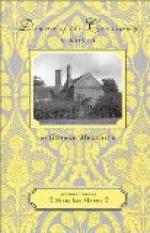Singularly enough, the man of these feelings was far from being a social rebel. His Diana conjured them forth in relation to her, but was not on his bosom to enlighten him generally. His notions of citizenship tolerated the female Pharisees, as ladies offering us an excellent social concrete where quicksands abound, and without quite justifying the Lady Wathins and Constance Aspers of the world, whose virtues he could set down to accident or to acid blood, he considered them supportable and estimable where the Mrs. Fryar-Gunnetts were innumerable, threatening to become a majority; as they will constantly do while the sisterhood of the chaste are wattled in formalism and throned in sourness.
Thoughts of Diana made phantoms of the reputable and their reverse alike. He could not choose but think of her. She was free; and he too; and they were as distant as the horizon sail and the aft-floating castaway. Her passion for Dacier might have burnt out her heart. And at present he had no claim to visit her, dared not intrude. He would have nothing to say, if he went, save to answer questions upon points of business: as to which, Lady Dunstane would certainly summon him when he was wanted.
Riding in the park on a frosty morning, he came upon Sir Lukin, who looked gloomy and inquired for news of Diana Warwick, saying that his wife had forbidden him to call at her house just yet. ’She’s got a cold, you know,’ said Sir Lukin; adding, ’confoundedly hard on women!—eh? Obliged to keep up a show. And I’d swear, by all that’s holy, Diana Warwick hasn’t a spot, not a spot, to reproach herself with. I fancy I ought to know women by this time. And look here, Redworth, last night —that is, I mean yesterday evening, I broke with a woman—a lady of my acquaintance, you know, because she would go on scandal-mongering about Diana Warwick. I broke with her. I told her I’d have out any man who abused Diana Warwick, and I broke with her. By Jove! Redworth, those women can prove spitfires. They’ve bags of venom under their tongues, barley-sugar though they look—and that’s her colour. But I broke with her for good. I doubt if I shall ever call on her again. And in point of fact, I won’t.’
Mrs. Fryar-Gunnett was described in the colouring of the lady.
Sir Lukin, after some further remarks, rode on, and Redworth mused on a moral world that allows a woman of Mrs. Fryar-Gunnett’s like to hang on to it, and to cast a stone at Diana; forgetful, in his championship, that Diana was not disallowed a similar licence.
When he saw Emma Dunstane, some days later, she was in her carriage driving, as she said, to Lawyerland, for an interview with old Mr. Braddock, on her friend’s affairs. He took a seat beside her. ’No, Tony is not well,’ she replied to his question, under the veil of candour. ’She is recovering, but she—you can understand—suffered a shock. She is not able to attend to business, and certain things have to be done.’




